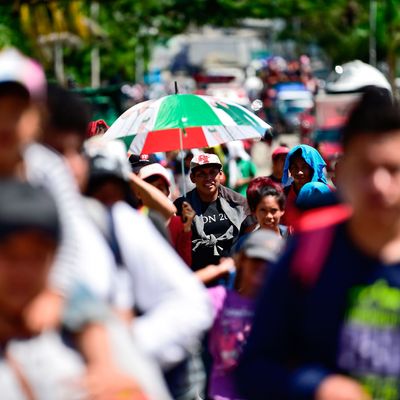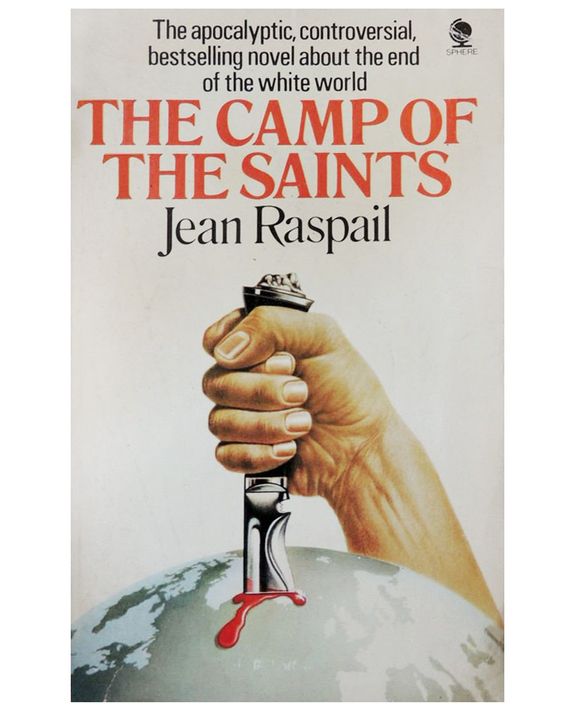
Last week Donald Trump launched a tweetstorm over the gradual approach to the U.S. border of a “caravan” of Central Americans (a few thousand people at the most):
Partisan politics aside, this whole meme involving a possible military response to refugees besieging the United States reminded me of something … and it finally hit me: It was pretty close to the central premise of The Camp of the Saints, Jean Raspail’s racist French novel of the 1970s that nativists have recently revived as offering a literary warning that the West’s self-destructive liberalism is betraying white people into the hands of their Third World enemies. Here is HuffPost’s brief summary of the book, which I happened to have read shortly after its publication in English in 1975:
The plot of The Camp of the Saints follows a poor Indian demagogue, named “the turd-eater” because he literally eats shit, and the deformed, apparently psychic child who sits on his shoulders. Together, they lead an “armada” of 800,000 impoverished Indians sailing to France. Dithering European politicians, bureaucrats and religious leaders, including a liberal pope from Latin America, debate whether to let the ships land and accept the Indians or to do the right thing — in the book’s vision — by recognizing the threat the migrants pose and killing them all.
The non-white people of Earth, meanwhile, wait silently for the Indians to reach shore. The landing will be the signal for them to rise up everywhere and overthrow white Western society.
The French government eventually gives the order to repel the armada by force, but by then the military has lost the will to fight. Troops battle among themselves as the Indians stream on shore, trampling to death the left-wing radicals who came to welcome them. Poor black and brown people literally overrun Western civilization.
Members of the latter-day anti-immigration movement and the alt-right alike have adopted the book as a sort of bible, as Sarah Jones noted earlier this year:
The Camp of the Saints is a veritable fixture on alt-right forums across the internet. It stars in Stormfront threads and appears on reading lists disseminated on 8chan’s /pol/ board. At VDARE, white nationalist writer Chris Roberts compared it to George Orwell’s 1984. The Camp of the Saints appears frequently on Reddit, in r/Europe and r/New_Right and r/DarkEnlightenment and r/The_Donald, where eager Trump fans even launched a live reading series. Matthew Heimbach, founder of the Traditionalist Worker’s Party, recommends the novel to his followers; so does Jared Taylor, founder of American Renaissance, which bills itself as “the internet’s premier race-realist site.”
But more respectable people with access to real political power view the book as foundational, too. These include most notably former Breitbart chairman and presidential counselor Stephen Bannon:
“It’s been almost a Camp of the Saints-type invasion into Central and then Western and Northern Europe,” he said in October 2015.
“The whole thing in Europe is all about immigration,” he said in January 2016. “It’s a global issue today — this kind of global Camp of the Saints.”
“It’s not a migration,” he said later that January. “It’s really an invasion. I call it the Camp of the Saints.”
“When we first started talking about this a year ago,” he said in April 2016, “we called it the Camp of the Saints. … I mean, this is Camp of the Saints, isn’t it?”
Shortly before the 2016 presidential contest began, Bannon’s young Breitbart protege Julia Hahn, who is still serves in the Trump White House, penned a long tribute to the book’s prophetic nature, noting Pope Francis’s advent as a migrant-loving Latin American pontiff; comparing Marco Rubio to Raspail’s great villain, the French traitor Albert Durfort; and accusing media elites of failing to warn Americans and Europeans of their imminent demise.
Nativist congressman Steve King touted the book in an Iowa radio interview last year as a sort of cultural antidote, as Slate reported:
Mickelson: If we don’t raise godly children to take our place … that vacuum will be filled by whatever washes up on our shore and makes a claim on our territory. Civilization has to be on purpose. Isn’t that correct, Congressman King?
King: It has to be on purpose and I would recommend a book to your listeners, and the title of it is The Camp of the Saints. And it’s written by a Frenchman, Jean—J-E-A-N—Raspail—R-A-S-P-A-I-L.
Even some conservatives who are repelled by the racism and brutality of Camp of the Saints believe it raises questions that must be asked, as Rod Dreher observes today, after he, too, recognized the “caravan” as an analogue:
The book is a kind of alt-right pornography, and I found it frequently repulsive to read. Yet looking at that migrant caravan heading north, that “numberless disinherited people of the South” who like a tidal wave, are marching north toward our fortunate country’s wide-gaping frontier — it’s impossible not to think about Raspail’s ugly prophetic work.
How far, ultimately, are the United States and Europe willing to go to control their own borders in the face of people who believe they have nothing to lose by trying to cross the frontier? And: at what point do most of us cease to believe that we have anything worth defending — and a majority of us come to believe that those numberless disinherited people from the South are “a kind of solution” to our terminal malaise?
Obviously, the fact that the “caravan” and the lurid way in which Trump is describing it resembles the migrant flotilla Raspail wrote about does not mean the novel’s apocalyptic clash on the shores of France will be brought to life on the Rio Grande. And perhaps Trump’s pledge to use the military to repel migrants is just another base-energizing gesture to conflate immigration with terrorism, or to pretend migrants are thoroughly marbled with ISIS members and other purveyors of violence.
But at some point, we have to take people seriously when they treat migrants as an existential threat to civilization, and the use of force against them as a sad but necessary measure of self-defense. Yes, it requires an unusual combination of paranoia and racism to view a few thousand poor people fleeing violence as justifying a panic. But the president of the United States has no compunctions about it:
What’s a little excessive violence when it’s needed to make a point and win an election?































